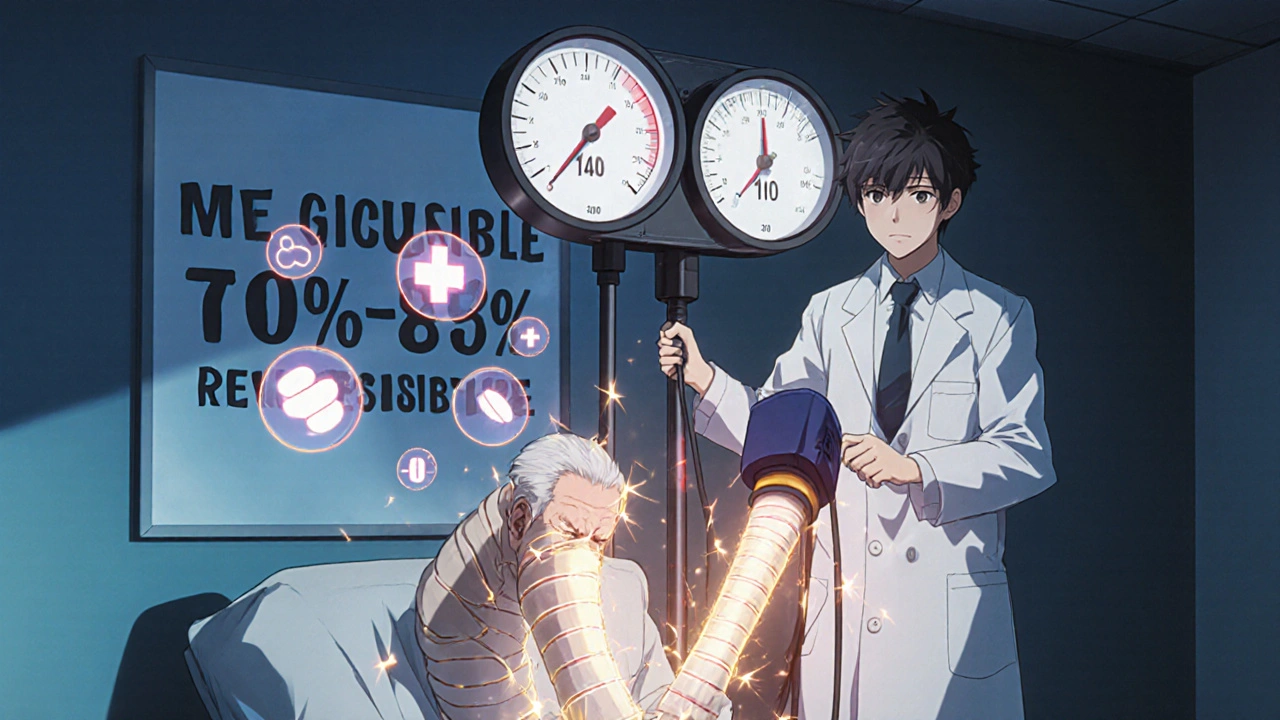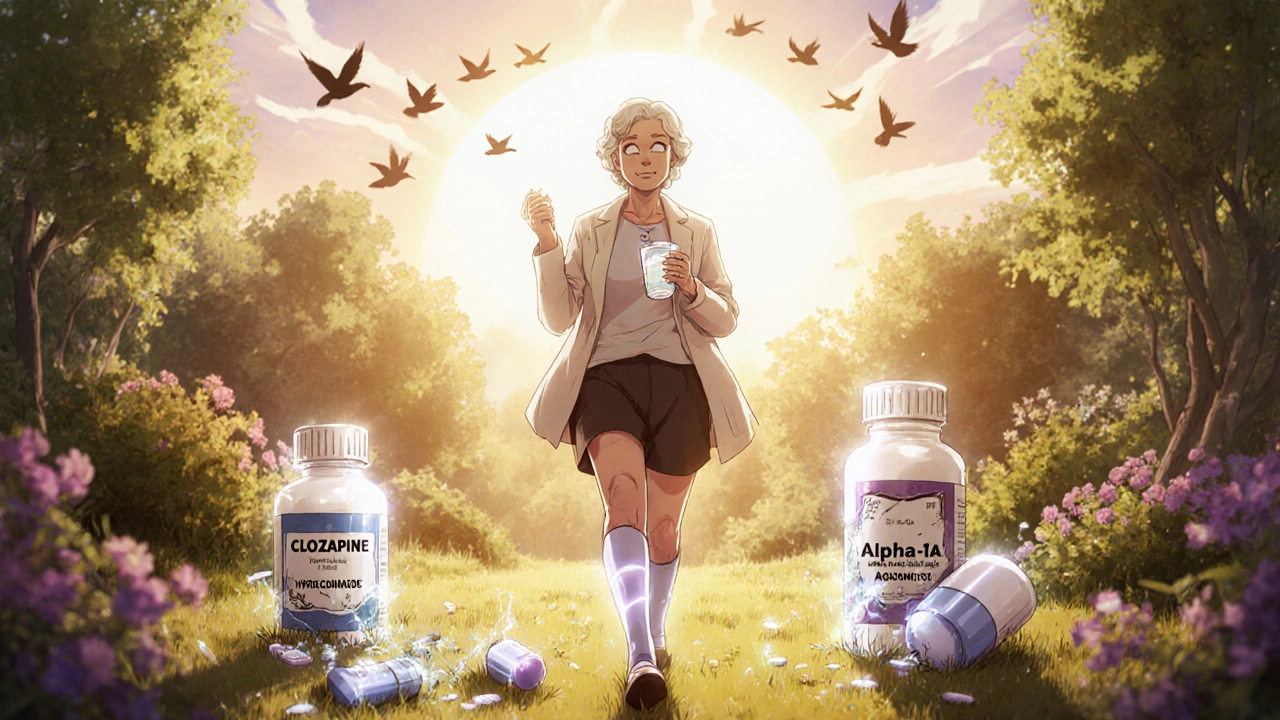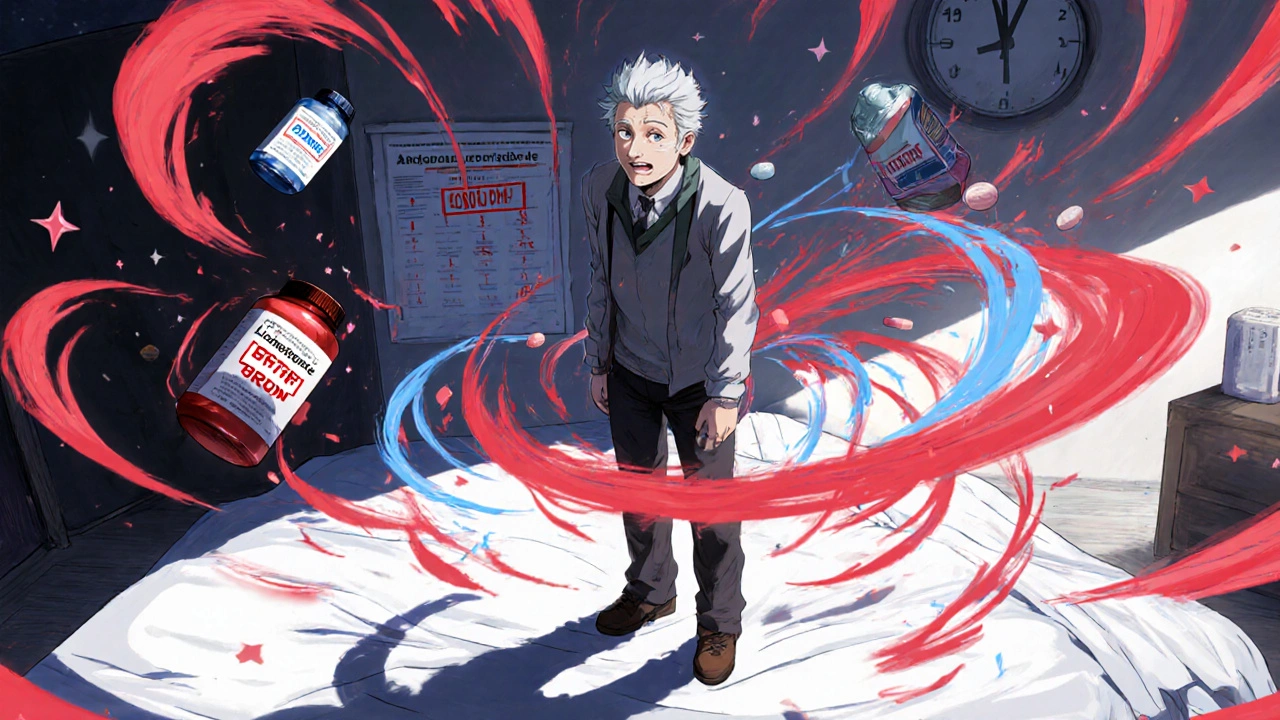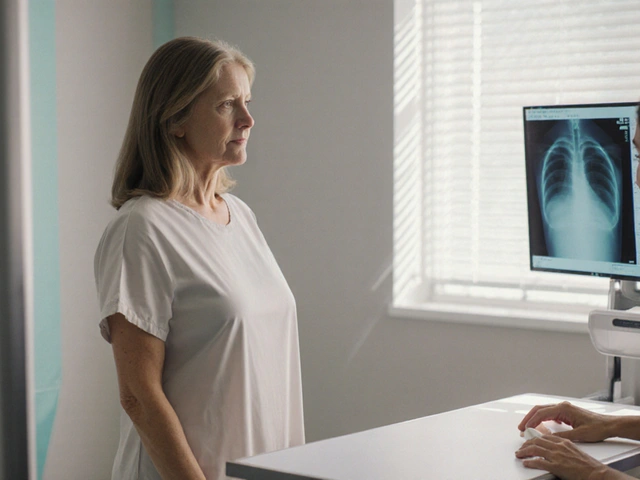Medication Risk Calculator for Orthostatic Hypotension
Select medications you're taking
Check all that apply (each counts as 1 risk point)
Standing up and feeling like the room is spinning? That sudden dizziness isn’t just being clumsy-it could be your medications. Orthostatic hypotension, or drug-induced hypotension, is one of the most common but overlooked side effects of everyday prescriptions. It happens when your blood pressure drops too fast after standing, leaving your brain short on blood flow. The result? Lightheadedness, blurred vision, or even fainting. And it’s not rare. Up to 30% of older adults on multiple medications experience this. Many don’t realize their pills are the cause until they fall-or worse.
What Exactly Is Orthostatic Hypotension?
Orthostatic hypotension means your blood pressure falls by more than 20 mm Hg systolic or 10 mm Hg diastolic within three minutes of standing. That’s not a small dip-it’s a sharp drop that cuts off oxygen to your brain. Your body normally reacts to standing by tightening blood vessels and speeding up your heart to keep blood flowing upward. But certain medications mess with that reflex. When that system fails, you feel dizzy, weak, or like you’re about to pass out. Symptoms usually hit within seconds to a few minutes after standing. Some people only get mild lightheadedness. Others faint. And for older adults, a single fall can lead to broken hips, hospital stays, or long-term disability.Which Medications Cause Dizziness on Standing?
Not all drugs cause this, but some are notorious. The biggest culprits fall into a few key groups:- Antihypertensives-Medicines meant to lower blood pressure can sometimes lower it too much. Diuretics like hydrochlorothiazide, ACE inhibitors like lisinopril, and calcium channel blockers are common offenders. A 2021 review found people on diuretics had nearly twice the risk of orthostatic hypotension.
- Antipsychotics-Drugs like quetiapine, clozapine, and chlorpromazine block adrenaline receptors, which weakens the body’s ability to maintain blood pressure. Up to 40% of patients on these meds report dizziness when standing. One Reddit user described fainting twice after starting quetiapine, with blood pressure dropping from 128/82 to 92/61 in under two minutes.
- Tricyclic antidepressants-Medications like amitriptyline and nortriptyline interfere with nerve signals that control blood vessel tone. Studies show they triple the risk of orthostatic hypotension compared to newer antidepressants.
- Opioids-Morphine, oxycodone, and hydrocodone can cause blood vessels to widen and slow heart rate. When combined with alcohol or benzodiazepines, the risk jumps 2.3 times. Many patients report dizziness within 5-10 minutes of standing.
- Parkinson’s drugs-Levodopa, the main treatment for Parkinson’s, causes orthostatic hypotension in 30-50% of users. This is especially dangerous because these patients are already at higher fall risk due to balance problems.
It’s not just the drug-it’s the combo. People taking four or more medications have over five times the risk of developing orthostatic hypotension. And age plays a big role: adults over 70 are more than three times as likely to experience it than younger adults.
Why Does This Happen?
Your body has a built-in system to keep blood flowing to your brain when you stand. Sensors in your neck (baroreceptors) detect the drop in pressure and tell your heart to beat faster and your blood vessels to squeeze tighter. Medications interfere with this in different ways:- Alpha-blockers (like doxazosin) stop blood vessels from tightening.
- Diuretics reduce blood volume, so there’s less fluid to push upward.
- Antidepressants and antipsychotics block the nerves that signal blood vessels to constrict.
- Opioids slow your heart and relax blood vessels.
Some people have a naturally weaker baroreflex due to aging or nerve damage. Medications just push them over the edge. That’s why two people on the same drug might react differently-one feels fine, the other faints.
How Is It Diagnosed?
Your doctor doesn’t guess-they measure. The standard test is simple:- Rest lying down for five minutes.
- Take your blood pressure and pulse.
- Stand up.
- Measure again at 1, 2, and 3 minutes after standing.
If your systolic pressure drops by 20 mm Hg or more, or your diastolic drops by 10 mm Hg or more, and you feel dizzy-diagnosis confirmed. Many people don’t realize their symptoms are linked to standing. A Mayo Clinic study found 55% of patients had symptoms for over two months before their doctor connected the dots. If you’re on meds and feel dizzy when you stand, don’t wait. Ask for the test.

What Can You Do About It?
The good news? Drug-induced orthostatic hypotension is often reversible. Here’s what works:- Review your meds-Talk to your doctor about every pill you take, including over-the-counter ones. Sometimes switching to a different drug in the same class helps. For example, replacing clozapine with ziprasidone cuts OH risk from 40% to under 10%.
- Adjust timing-Take blood pressure-lowering meds at night if possible. That way, the peak effect happens while you’re lying down, not when you’re getting up in the morning.
- Hydrate-Drink 2-2.5 liters of water daily. Dehydration makes blood pressure drops worse. A cup of water before standing can help.
- Wear compression stockings-These help push blood back up from your legs. Studies show they reduce dizziness in over 60% of patients.
- Move slowly-Sit on the edge of the bed for a minute before standing. Use a handrail. Don’t rush. A slow transition gives your body time to adjust.
- Avoid heat and alcohol-Hot showers, saunas, and alcohol all widen blood vessels and make dizziness worse.
One patient at Cleveland Clinic had recurrent falls on hydrochlorothiazide and lisinopril. After stopping the diuretic, her symptoms vanished in 72 hours. That’s the power of targeted changes.
When Medication Adjustment Isn’t Enough
If lifestyle changes don’t help, doctors may turn to medication. Midodrine, a drug that tightens blood vessels, is now recommended as a first-line treatment when non-drug methods fail. Taken three times a day, it reduces symptoms in about 65% of patients. Fludrocortisone, which helps retain salt and water, is another option. But these are last-resort treatments-they come with their own side effects and aren’t for everyone.Why This Matters More Than You Think
Orthostatic hypotension isn’t just about dizziness. It’s a red flag for bigger risks:- Falls: People with OH have a 15-30% higher chance of falling.
- Brain health: Chronic low blood flow to the brain is linked to faster cognitive decline.
- Mortality: Studies show a 24-32% higher risk of death over 10 years in people with untreated OH.
In the U.S., falls related to orthostatic hypotension cost Medicare $31 billion in 2022. About 30-40% of those costs come from medication-induced cases. That’s not just a medical issue-it’s a systemic failure. Many doctors still don’t screen for it routinely. But since 2022, the American Geriatrics Society’s Beers Criteria has listed 12 high-risk medications for older adults, pushing more clinics to check for OH during annual visits.

What’s Changing in 2025?
The field is moving fast. Pharmaceutical companies are now developing new drugs designed to avoid OH. Seven are testing alpha-1A selective agonists-medications that treat the main condition (like high blood pressure or Parkinson’s) without triggering dizziness. In clinical trials, these show promise with far fewer blood pressure drops.Also, genetic testing is being explored. Researchers are identifying gene variants that make some people more prone to OH from certain drugs. A Phase II trial (NCT04567890) is testing whether genetic markers can predict who’s at highest risk-so doctors can pick safer meds from the start.
What to Do Right Now
If you’re on any of these meds and feel dizzy when you stand:- Write down when and how often it happens.
- Check your blood pressure at home-stand up after lying down and record the numbers.
- Don’t stop your meds cold. Talk to your doctor. Ask: “Could any of my drugs be causing this?”
- Ask for a standing blood pressure test.
- Start drinking more water and wearing compression socks.
Most cases improve within days to weeks after adjusting meds. You don’t have to live with dizziness. It’s not normal aging-it’s a side effect. And side effects can be fixed.
Can orthostatic hypotension go away on its own?
Yes, if it’s caused by medication. In 70-85% of cases, symptoms improve or disappear after adjusting, reducing, or stopping the drug. It usually takes a few days to a couple of weeks. But if it’s caused by nerve damage (like in Parkinson’s), it’s less likely to resolve without treatment.
Is orthostatic hypotension dangerous?
It can be. While mild dizziness is annoying, repeated drops in blood pressure increase your risk of falls, head injuries, and fractures-especially in older adults. Long-term, it’s linked to higher rates of stroke, heart problems, and death. It’s not just about fainting-it’s about long-term brain and heart health.
Can I still drive if I have orthostatic hypotension?
It depends. If you’ve had fainting episodes or frequent dizziness, driving can be unsafe. Many people manage it well with medication changes and slow movements. But if you’ve passed out while standing, you should avoid driving until your doctor confirms your symptoms are under control. Some states require reporting conditions that affect driving safety.
Do I need to see a specialist?
Not always. Your primary doctor can diagnose and manage most cases. But if you’re on multiple high-risk meds, have other neurological conditions (like Parkinson’s or diabetes), or symptoms don’t improve after adjusting drugs, a cardiologist or neurologist with experience in autonomic disorders can help.
Are there any natural remedies that help?
Hydration, salt intake (if not contraindicated), compression stockings, and slow posture changes are the most effective natural strategies. Some people find caffeine in the morning helps temporarily by raising blood pressure. But no supplement (like licorice root or ginger) has strong evidence for treating drug-induced OH. Always check with your doctor before trying anything new.






Kent Anhari
October 29, 2025 AT 08:07Been there. Started taking lisinopril for blood pressure and nearly took out my coffee table last Tuesday. Didn't realize it was the med until I checked my BP standing vs sitting. Huge drop. My doc switched me to losartan and boom-no more spinning room. Seriously, if you're dizzy when you stand, don't just chalk it up to aging. Ask for the test.
Also, hydration helped a ton. Started drinking a full glass of water before getting out of bed. Game changer.
Charlos Thompson
October 30, 2025 AT 16:50Oh wow, another ‘meds are evil’ post. Next you’ll tell me oxygen causes dizziness if you breathe too fast. Jesus Christ, we’ve turned every normal physiological response into a pharmaceutical crisis. Maybe if people stopped eating Pop-Tarts and started walking, they wouldn’t need 7 pills just to stand up without feeling like a drunk penguin.
Peter Feldges
October 31, 2025 AT 14:47While I appreciate the clinical thoroughness of this piece, I must respectfully note that the systemic under-screening of orthostatic hypotension remains a glaring gap in primary care protocols-particularly in geriatric populations. The American Geriatrics Society’s Beers Criteria, while a step forward, is still inconsistently implemented across institutions. Furthermore, the economic burden cited ($31B in 2022) underscores a critical misalignment between preventive medicine and reimbursement structures. Until payers incentivize pre-fall risk assessments, this will remain a silent epidemic. I urge clinicians to adopt standardized standing BP protocols as part of routine annual wellness visits. Thank you for raising awareness.
Richard Kang
October 31, 2025 AT 20:14OMG YES I WAS JUST TALKING TO MY DOCTOR ABOUT THIS!! I’M ON AMITRIPTYLINE FOR MIGRAINES AND I FELT LIKE I WAS GOING TO PASS OUT EVERY TIME I GOT UP TO GO TO THE BATHROOM!! I THOUGHT I WAS JUST WEAK OR SLEEP-DEPRIVED BUT NOOOOO-IT’S THE DRUG!! I’M SWITCHING TO SERTRALINE NEXT WEEK AND I HOPE TO GOD I STOP FEELING LIKE A WALKING ZOMBIE!! ALSO WHY ISN’T THIS ON EVERY MEDICATION LABEL???
Rohit Nair
November 1, 2025 AT 01:08My uncle in Delhi had this after starting levodopa for Parkinson’s. He’d fall every morning trying to get tea. We got him compression socks and told him to sit for 2 mins before standing. No more falls. Simple things work. Also, he started drinking buttermilk with a pinch of salt-helped his fluid balance. No magic pills, just smart habits. 🙏
Wendy Stanford
November 1, 2025 AT 01:08It’s fascinating how modern medicine has become a paradox: we treat symptoms with chemicals that create new, often more dangerous symptoms, then we treat those with more chemicals, and so on, ad infinitum, until the body is just a battlefield of pharmacological collateral damage. We’ve forgotten that the human nervous system evolved over millennia to regulate itself-until we decided we knew better. And now we’re surprised when it breaks down? We didn’t cure disease-we just turned the body into a Rube Goldberg machine made of pills.
Jessica Glass
November 1, 2025 AT 10:43Oh so now it’s ‘not normal aging’? Like, what, you mean the fact that my 78-year-old neighbor can’t stand up without grabbing the wall is because of her 12 meds and not because she’s just… old? Newsflash: bodies wear out. Maybe if people didn’t take 10 different drugs just to feel ‘normal’ they wouldn’t be falling over. But no, let’s blame the pills. Always the pills. Convenient.
Krishna Kranthi
November 2, 2025 AT 22:56bro i took quetiapine for anxiety and yeah i passed out once trying to make coffee. like literally blacked out for 3 sec. woke up on the kitchen floor with coffee all over my shirt. doc switched me to mirtazapine and boom-no more fainting. also i started drinking coconut water and wearing those ankle socks. weird combo but it works. also dont drink alcohol before standing. learned that the hard way lol
Lilly Dillon
November 3, 2025 AT 10:39I’ve been on hydrochlorothiazide for 5 years. Never realized it was making me dizzy until I started measuring my BP at home. Went from 130/80 sitting to 98/60 standing. Scary. Stopped it cold turkey after talking to my doctor-no more dizziness. Honestly, I wish I’d known sooner. This should be standard info on every prescription bottle.
Jenn Clark
November 4, 2025 AT 00:06Thank you for writing this. I’ve been advocating for my mom to get her meds reviewed for months. She’s on 6 prescriptions and says she’s just ‘getting clumsy.’ It’s heartbreaking to watch someone accept dizziness as normal. This post gave me the exact language I needed to talk to her doctor. I’ll be printing it out and bringing it to her next appointment.
L Walker
November 4, 2025 AT 00:23Compression stockings. Seriously. My mum swears by them. Got a pair from the pharmacy, wore them every day after her hip surgery. No more fainting episodes. Cheap. Easy. No side effects. Why isn’t this the first-line advice in every GP’s office?
giri pranata
November 4, 2025 AT 05:54Been on meds for hypertension for 8 years. Started feeling dizzy last winter. Thought it was the cold. Then I read this and checked my BP standing. 140/85 → 90/58 in 90 seconds. Holy cow. Switched from lisinopril to valsartan. Took 3 days. No more wooziness. Also started drinking 3L water a day. My wife says I’m like a new person. Don’t ignore this. It’s fixable.
Shiv Sivaguru
November 5, 2025 AT 12:10Why do we even need all these meds? Just eat less salt, walk more, drink water. Problem solved. But nooo, let’s invent a new pill for the side effect of the first pill. Then another pill for the side effect of the second pill. It’s like a pharmaceutical Russian nesting doll. I’m just waiting for the pill that makes you not need pills.
Jesse Weinberger
November 6, 2025 AT 02:05Actually, orthostatic hypotension is just your body telling you you’re not a robot. If you’re dizzy standing up, maybe you’re just dehydrated, stressed, or haven’t eaten. Not everything is a drug problem. I’ve been on 3 different meds for 10 years and never had this issue. Maybe it’s not the pills-it’s you. Just saying.